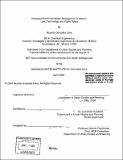| dc.contributor.advisor | Lawrence Susskind. | en_US |
| dc.contributor.author | Gonzalez Llera, Ricardo, 1971- | en_US |
| dc.contributor.other | Massachusetts Institute of Technology. Dept. of Urban Studies and Planning. | en_US |
| dc.coverage.spatial | n-mx--- | en_US |
| dc.date.accessioned | 2005-06-02T18:22:28Z | |
| dc.date.available | 2005-06-02T18:22:28Z | |
| dc.date.copyright | 2004 | en_US |
| dc.date.issued | 2004 | en_US |
| dc.identifier.uri | http://hdl.handle.net/1721.1/17717 | |
| dc.description | Thesis (S.M.)--Massachusetts Institute of Technology, Dept. of Urban Studies and Planning, 2004. | en_US |
| dc.description | Includes bibliographical references. | en_US |
| dc.description.abstract | What is electronic waste? Why is it considered a problem? What are the public health implications of its mishandling? The electronic industry, a sector that has experienced one of the highest growth rates of the last decade, has had a great success in growing the mass consumer market for personal computers, cell phones, and other types of personal electronic equipment. Supporting this incredible growth, the electric industry has also provided electric cells and battery systems to power all these devices. Unfortunately, personal computers as well as other electric and electronic equipment (EEE) become obsolete faster than ever. The mounting quantities of obsolete EEE and spent batteries represent a serious problem for the industrial sector, as well as for governments and citizens, not only because of the volumes being generated, but because of the hazardous materials and toxic metals, including lead, nickel, cadmium, mercury and chromium to mention some of the most important health wise and the gold, copper, aluminum, nickel, silver and palladium they contain. These contents also offer incentives for their collection and recovery. They need to be diverted from the waste stream reaching the sanitary landfills and in some instances incineration facilities, to reduce public exposure to these toxic substances and avoid the public health burdens they represent. What is the dimension of this problem in Mexico? Mexico has generated at least 6.3 million obsolete computers during the last decade, and by the end of 2006, 10 million additional personal computers will become obsolete. Not all of them will reach the municipal solid waste (MSW) stream the same year they become obsolete. | en_US |
| dc.description.abstract | Hoarding by final users must be considered in designing any collection program. Even taking account of hoarding, almost 3 million computers will be available for collection in 2005 and 10 million computers will be available for collection by 2013. For spent cells and batteries in Mexico, the numbers are not very clear. The best estimate is that 450 million cells and batteries will be purchased annually (90 million rechargeable batteries and 148.5 million primary cells). At least 25% of them (hoarding of spent batteries has been estimated at about 75%) will be introduced into the municipal waste stream, some 37 million batteries every year. Taking into consideration Mexico's waste management infrastructure, what are the related Public Health effects of electronic waste? What are the risks associated with the final treatment options available? What can be done to reduce the E-Waste burden? Which collection and recycling mechanisms can be implemented in the Mexican context? The present work deals with these questions and introduces a proposed collection and recycling program to address Mexico's needs. | en_US |
| dc.description.statementofresponsibility | by Ricardo Gonzalez Llera. | en_US |
| dc.format.extent | 128 p. | en_US |
| dc.format.extent | 6074596 bytes | |
| dc.format.extent | 6074405 bytes | |
| dc.format.mimetype | application/pdf | |
| dc.format.mimetype | application/pdf | |
| dc.language.iso | eng | en_US |
| dc.publisher | Massachusetts Institute of Technology | en_US |
| dc.rights | M.I.T. theses are protected by copyright. They may be viewed from this source for any purpose, but reproduction or distribution in any format is prohibited without written permission. See provided URL for inquiries about permission. | en_US |
| dc.rights.uri | http://dspace.mit.edu/handle/1721.1/7582 | |
| dc.subject | Urban Studies and Planning. | en_US |
| dc.title | Integrated electronic waste management in Mexico : law, technology and public policy | en_US |
| dc.type | Thesis | en_US |
| dc.description.degree | S.M. | en_US |
| dc.contributor.department | Massachusetts Institute of Technology. Department of Urban Studies and Planning | |
| dc.identifier.oclc | 56429517 | en_US |
